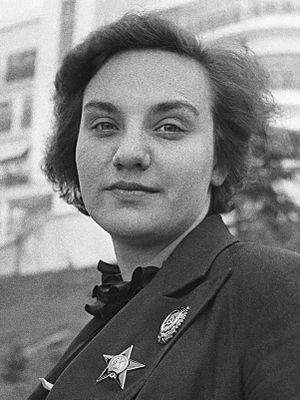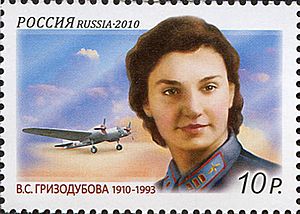Valentina Grizodubova facts for kids
Quick facts for kids
Valentina Grizodubova
|
|
|---|---|
 |
|
| Born | 27 April [O.S. 14 April] 1909 Kharkiv, Kharkov Governorate, Russian Empire |
| Died | 28 April 1993 (aged 83) Moscow, Russia |
| Allegiance | |
| Service/ |
|
| Rank | Colonel |
| Commands held | 101st Long-Range Aviation Regiment |
| Awards | Hero of the Soviet Union Hero of Socialist Labour |
Valentina Stepanovna Grizodubova (Russian: Валентина Степановна Гризодубова, Ukrainian: Валентина Степанівна Гризодубова Valentyna Stepanivna Hryzodubova; born April 27, 1909, in Kharkov – died April 28, 1993, in Moscow) was an amazing Soviet pilot. She was one of the very first female pilots in the Soviet Union to be given the special award called Hero of the Soviet Union. She was also the only woman to receive a second top award, the Hero of Socialist Labour.
Contents
Early Life and Flying Adventures
Valentina was born in Kharkiv, which is now in Ukraine. Her father, Stepan Vasilyevich Grizodubov, was a pioneer in designing airplanes. This meant she grew up around planes!
She was very talented from a young age. When she was just fourteen, she flew a glider by herself. Gliders are planes that fly without an engine. Valentina also played the piano and studied at a music school. She learned several languages and even went to a technical institute.
In 1929, she finished her training at the Penza Flying Club. She also trained at the Kharkov Flight School. By 1933, she had graduated from the Tula Advanced Flying School. There, she became a flight instructor. She taught 86 male pilots how to fly, and many of them later became Heroes of the Soviet Union themselves.
From 1934 to 1938, Valentina flew for a special "Propaganda" Squadron. This group used planes to spread messages and show off Soviet aviation skills.
Setting World Records
Valentina flew many different kinds of aircraft. She even set seven world records! One record was for flying the highest in a two-seater seaplane. On October 15, 1937, she reached an amazing height of 3,267 meters (about 10,718 feet). She also set three speed records.
Another big achievement was a long-distance flight from Moscow to Aktyubinsk. She flew this with another famous pilot, Marina Raskova.
The Rodina Flight
Valentina's most famous flight happened on September 24-25, 1938. She was the main pilot, with Marina Raskova as the navigator and Polina Osipenko as the co-pilot. They flew an Antonov ANT-37 plane.
Their flight was called Rodina, which means "Motherland" in Russian. They flew a distance of 5,910 kilometers (about 3,672 miles) without stopping. This set a new international women's record for a straight-line distance flight.
Before this historic flight, Valentina had already flown for 5,000 hours. After their amazing journey, she and her crew became the first women to receive the title of Hero of the Soviet Union. This special award was given to them on November 2, 1938. They also received a reward of 25,000 rubles.
Valentina in World War II
In March 1942, Valentina joined the fight in the German-Soviet War, which was part of World War II. She became the commanding officer of the 101st Long-Range Aviation Regiment. This unit was created in May 1942 and had about 300 men, including pilots, navigators, and ground crew.
Her unit flew Lisunov Li-2 transport aircraft. These planes were like the American Douglas DC-3 but built in the Soviet Union. The pilots were from the Civil Air Fleet.
Helping the War Effort
Each Li-2 plane had a crew of six people: a pilot, co-pilot, navigator, flight-technician, radio operator, and air gunner. At first, Valentina's unit bombed enemy troops. In June 1942, they also helped supply the city of Leningrad, which was under attack.
Later, the 101st Regiment was ordered to bomb German army units. These units were moving towards Voronezh. Valentina led her regiment on missions almost every night. They had to fly through strong anti-aircraft fire and face German night fighter planes. These dangerous flights took place in areas like Kursk, Orel, and L'gov.
In September 1942, the 101st Long-Range Aviation Regiment started working with the Central Headquarters of the Partisan Movement. Partisans were groups of people fighting behind enemy lines. Valentina's unit flew over 1,850 missions to areas controlled by partisans. They delivered about 1,500 tons of weapons and ammunition. They also brought hundreds of tons of radio equipment, printing presses, and reading materials for the partisan leaders.
The Regiment also helped evacuate people. They rescued 2,500 wounded partisans and children who had lost their homes. Flying these missions was very risky because of poor landing strips and enemy fighters. Valentina had an idea: by March 1943, the partisans built a better airstrip near the Dnieper River. Up to a dozen planes could park there during the day.
On May 27, 1944, her regiment received a special honor called Krasnosel'skiy. This was for their part in breaking the siege of Leningrad. Valentina was called back to Moscow in June 1944. By then, she had flown about 200 missions herself. Two months later, on August 30, her regiment received another award, the Order of the Red Banner. It was also given the special title of "Guards."
After the War
In the 1940s, Valentina had another important role. She was the only woman on a special group called the "Extraordinary State Commission." This group investigated war crimes done by the German-Fascist invaders in the Soviet Union. They also worked to figure out how much damage the country had suffered.
Valentina also helped another famous woman, Svetlana Savitskaya, become a test pilot. Svetlana later became a cosmonaut (a space traveler).
Legacy
Valentina Grizodubova is an Honorary Citizen of Penza. There is also a monument dedicated to her in Moscow.
Awards
- Hero of the Soviet Union (November 2, 1938)
- Hero of Socialist Labour (January 6, 1986)
- Two Orders of Lenin (November 2, 1938, and January 6, 1986)
- Order of the October Revolution (April 26, 1971)
- Order of the Patriotic War 1st Class (March 12, 1943)
- Order of the Red Banner of Labour (December 25, 1936)
- Order of the Red Star (December 19, 1937)
- Many campaign and jubilee medals
See also
 In Spanish: Valentina Grizodúbova para niños
In Spanish: Valentina Grizodúbova para niños
 | Stephanie Wilson |
 | Charles Bolden |
 | Ronald McNair |
 | Frederick D. Gregory |


